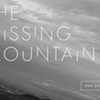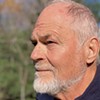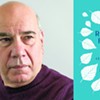Published April 11, 2006 at 12:22 p.m. | Updated October 26, 2021 at 8:04 p.m.
By the spring of 414 B.C., when Aristophanes' play The Birds debuted on the Greek stage, Athenians were weary of their government's imperialism. The Peloponnesian War had taken their men and eroded their resources. An attack on the neutral island of Sicily seemed destined to provoke more losses.
In this environment, The Birds struck a comedic chord. It told of two men, Makedo and Goodhope, who leave their civilization's bustle and heave to establish a city among a colony of birds, only to destroy it with citified ways. But first comes the moment of hope - when it seems men can do something right:
Here is arrived a sharp old man
Of revolutionary mind,
To revolutionary deeds inclined;
Come all and listen to his plan.
Hither, hither, hither.
Michael Collier has been directing Middlebury College's Breadloaf Writer's Conference since 1995, but clearly this pastoral summer occupation hasn't shielded him from the drumbeats of war in this country. His latest volume, Dark Wild Realm, begins with lyrics of awe and wonder at his fine, feathered friends, and concludes with bitter meditations on how they tempt us to believe we, too, are beyond gravity.
I loved all the shibboleths
for torture, all the archaic
pleading that made you
smother what I tried to say
by saying, "Come with me,
inhabit the inch of air
between our forms and their
vaporous happenstance."
Only Poe could invent a comparable aviary, which turns menacing so quickly. The question that remains, in Aristophanes' play and here, is: Who poisons the air? Is it the birds that come from the dark wild realm? Or is it us? Collier's book elegantly circles this question, peering down upon it from various angles like a bird eyeballing its prey. It never once directly invokes the language of war. However, the sounds are ominous from the very beginning.
One had feathers like a blood-streaked koi,
another a tail of color-coded wires.
One was a blackbird stretching orchid wings,
another was a flicker with a wounded head.
Collier is an agile, precise writer who never worries his lines into clarity. Each line break cuts sharper and sharper, each new line swallowing exactly the right amount of oxygen. So that by the end of his poems, his concluding image is not just beautiful; it feels inevitable. In "Lost Horizon," he concludes a poem about birds' migration with three lines that seem to consume themselves on their way to the finale period:
And yet the birds, lifting one by one, retraced what they had
been,
while filling up the emptiness they had made, returning
to whatever they had come, if such a place existed for so many.
The poems of Dark Wild Realm toggle back and forth between the bird realm and the human. By comparison, the human world seems ground-bound, tethered and finite. Death crowds out any glory. In "The Watch," the poet attends a funeral and sees the presiding priest frequently checking his timepiece, "the habit / of a man who always has / a next place to be."
Birds appeal to us, these poems suggest, because they help us escape our chintzy mortal window. Throughout Dark Wild Realm, Collier writes with his eyes turned upward, his senses tuned outward to the world of weather and of snow - the elements humans must move through and, in so doing, briefly become animals again.
"The Missing Mountain" captures the wonder that rises up in these moments, when the natural world dwarfs our workaday selves and heavenly evolution seems possible.
"Oh wouldn't it be nice," the Beach Boys
harmonized. And it was. Sometimes I saw
the Milky Way invade the grid, Andromeda,
Draco, and great Betelgeuse bridging
the avenues and lanes, filling up acres
of vast parking lots. Sometimes I stared
powerfully into space where glowworms
of matter spun in pinwheels of gas.
What does it mean to be alive?
a voice asked. What does it mean . . .
It takes a fine, deft hand to smuggle these questions aloft in a poem without having it plummet heavily to the ground. Collier seems to write with hollow-boned words, and he can perform deft feats of elevation in the blink of an eye - much like the paralyzed tree pruner who hoists himself up a blighted tree in "The Lift."
In poems like this, Collier pays homage to birds by imitating their flight. But he never forgets their dark blood thirst. As this volume closes, that aspect of birds takes center stage, signaling how quickly dreams can turn to hubris, and hubris to violence.
In "Turkey Vultures," Collier comes the closest to penning an indictment, or a grotesquerie, of the current leadership in Washington:
The red drill of their faces, pink-tipped,
grubbed in gore, cyclopean in their hunger
for the dead but not the dying, lugubrious
on their perches from towers, in trees, where they
convene like ushers on church steps.
Maybe one day, like readers who pick through Aristophanes' The Birds today, we will find this terribly funny.
More By This Author
Speaking of...
-

Vermont Book Award Winners Announced
May 6, 2023 -

Vermont State Colleges Reverse Library Layoffs, Athletics Shakeup
Apr 24, 2023 -

Local Children's Book Buyers Offer Reading Recommendations
Nov 15, 2022 -

The Inaugural Green Mountain Book Festival Kicks Off This Weekend
Sep 21, 2022 -

Review of Sen. Patrick Leahy's New Memoir
Aug 26, 2022 - More »
Comments
Comments are closed.
From 2014-2020, Seven Days allowed readers to comment on all stories posted on our website. While we've appreciated the suggestions and insights, right now Seven Days is prioritizing our core mission — producing high-quality, responsible local journalism — over moderating online debates between readers.
To criticize, correct or praise our reporting, please send us a letter to the editor or send us a tip. We’ll check it out and report the results.
Online comments may return when we have better tech tools for managing them. Thanks for reading.











































